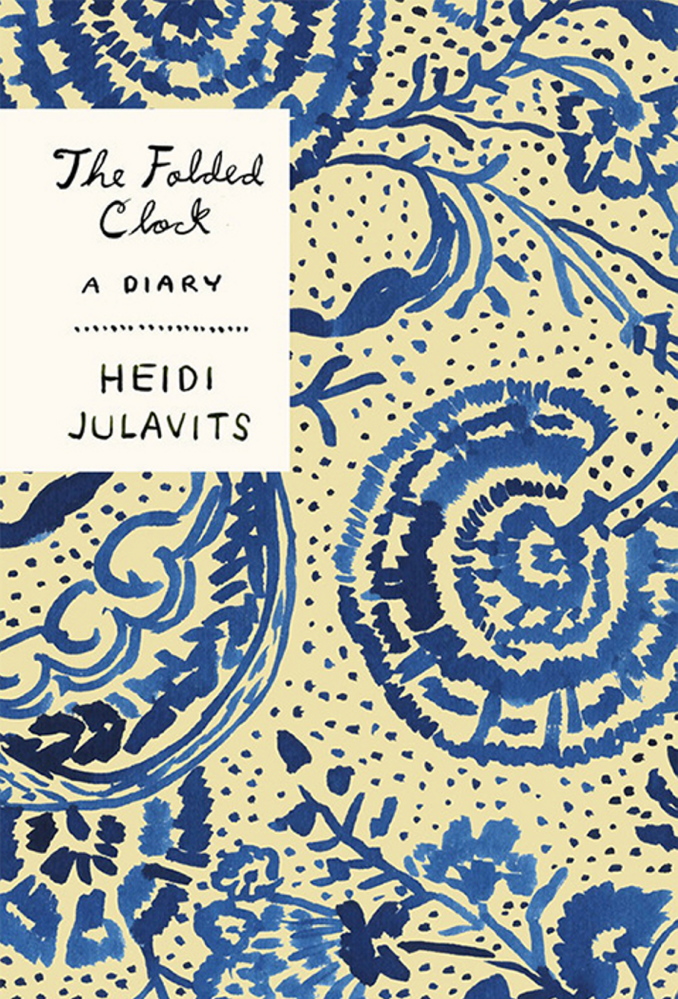When acclaimed novelist and author Heidi Julavits stumbled upon her childhood diaries 10 years ago, she expected great things. She imagined they would provide a roadmap to the person and author she had become. Instead they displayed a wince-worthy dullness better suited to a “paranoid tax auditor,” she says. The young Julavits fixated on grades, looks and boys – not the stuff of greatness. An antidote was clearly in order.
So began “The Folded Clock,” a grown-up diary for the new millennium. It’s a clever hook for a volume that is equal parts travelogue, meditation and confessional. There’s no mistaking this rendition of Julavits for a tax auditor. This time around, she’s more like a mash-up of Lena Dunham and Kierkegaard. Which is to say, the book is at once raunchy, outrageous and funny, wistful, contemplative and smart.
Julavits, 47, is no garden-variety neurotic, nor are her observations run-of-the-mill. A lifelong striver, this Portland native spent her early years angling to be elsewhere, only to land in New York (teaching at Columbia), where she now pines for summers in Maine. Julavits calls herself “an object person,” by which she means that she clings to material things – “not for status reasons,” she says, but for “plain anchor reasons.” As a child, she slept with a broken lamp as a way to guarantee its survival; otherwise it was doomed to be tossed. As an adult, she carries in her purse an old cracked enamel tap water handle, which she draws daily before starting to write. If there is an underlying angst at work here, there’s no lack of mishegoss to support it.
As a vehicle, the diary provides a natural format for the sorts of ruminations that the author conducts. While waiting to board a flight at JFK, for instance, she finds a Rolodex in an airport trashcan. Should she take it, or leave it, and what are the ramifications of each? Like many of the episodes that she narrates, the particular becomes a springboard for broader contemplations. Invariably, she dives in – or, in this case, takes the Rolodex – then puzzles over the whys and wherefores.
“Somebody needed to release himself from these bad feelings,” she says. “He’d thrown the (Rolodex) away, betting on the psychic exorcism of a landfill burial. I’d screwed up the process. I’d kept live what should have been dead.”
Overall, the episodes and vignettes suggest the maelstrom that is the author’s life – a mix of changing roles and inner qualms, synergies and machinations. Themes emerge, characters recur, and the author’s bent of mind becomes the lens through which we see.
About that bent of mind: Julavits is a storyteller to the bone, who gladly sacrifices herself in service to her tales. She is the butt of jokes, an instigator and, at times, a terror. Some vignettes play like comedy routines, as when she throws a tantrum in a supermarket in Germany, where she can be overheard by many English-speaking Germans. She has picked a fight with her husband, allegedly about Nazi aesthetics, and she’s off and running. As her volume ramps up, her husband, disarmed, whispers, “Please, let’s not fight about Hitler.”
Julavits populates the book with an assortment of characters – friends and strangers, gurus, psychics, students, former boyfriends and, above all, family. Perhaps most movingly, the author reflects on her own restlessness in the face of those who most need her attention and the fact that she’s quickly nearing her parental shelf life. “I spent so little time with my children that they started to call me ‘dad’…. Also, my children are on the verge of not needing me at all,” she says. “When I get home, I will only be their maid.”
When she started this project, Julavits couldn’t have known that two years of chronicling her life would cohere in quite this fashion – that her job as middle-age diarist would yield a book that is irresistible and, at times, transcendent.
Joan Silverman writes op-eds, essays and book reviews. Her work has appeared in The Christian Science Monitor, Chicago Tribune and Dallas Morning News.
Send questions/comments to the editors.



